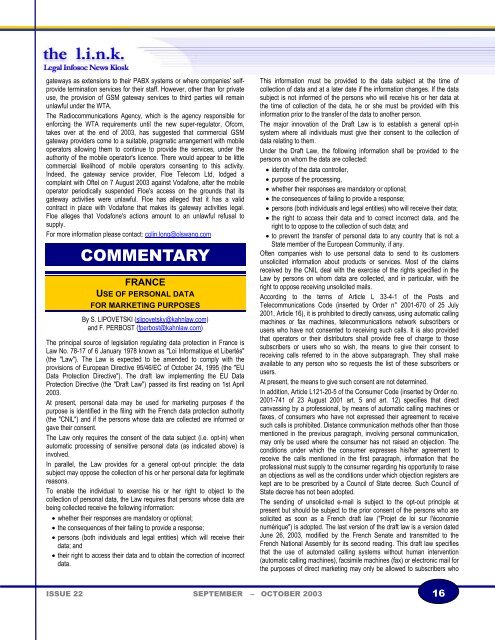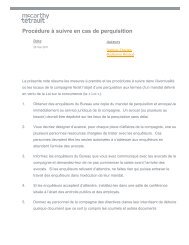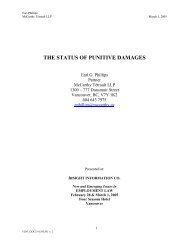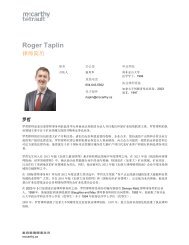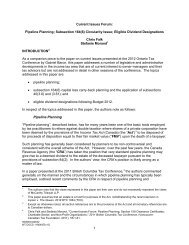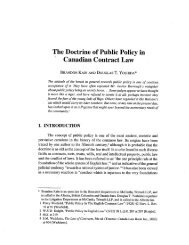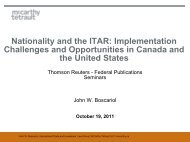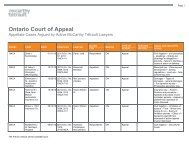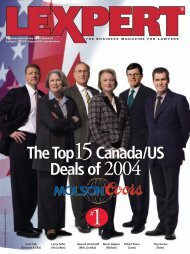1. COMPETITION - McCarthy Tétrault
1. COMPETITION - McCarthy Tétrault
1. COMPETITION - McCarthy Tétrault
Create successful ePaper yourself
Turn your PDF publications into a flip-book with our unique Google optimized e-Paper software.
gateways as extensions to their PABX systems or where companies' selfprovide<br />
termination services for their staff. However, other than for private<br />
use, the provision of GSM gateway services to third parties will remain<br />
unlawful under the WTA.<br />
The Radiocommunications Agency, which is the agency responsible for<br />
enforcing the WTA requirements until the new super-regulator, Ofcom,<br />
takes over at the end of 2003, has suggested that commercial GSM<br />
gateway providers come to a suitable, pragmatic arrangement with mobile<br />
operators allowing them to continue to provide the services, under the<br />
authority of the mobile operator's licence. There would appear to be little<br />
commercial likelihood of mobile operators consenting to this activity.<br />
Indeed, the gateway service provider, Floe Telecom Ltd, lodged a<br />
complaint with Oftel on 7 August 2003 against Vodafone, after the mobile<br />
operator periodically suspended Floe's access on the grounds that its<br />
gateway activities were unlawful. Floe has alleged that it has a valid<br />
contract in place with Vodafone that makes its gateway activities legal.<br />
Floe alleges that Vodafone's actions amount to an unlawful refusal to<br />
supply.<br />
For more information please contact: colin.long@olswang.com<br />
COMMENTARY<br />
FRANCE<br />
USE OF PERSONAL DATA<br />
FOR MARKETING PURPOSES<br />
By S. LIPOVETSKI (slipovetsky@kahnlaw.com)<br />
and F. PERBOST (fperbost@kahnlaw.com)<br />
The principal source of legislation regulating data protection in France is<br />
Law No. 78-17 of 6 January 1978 known as "Loi Informatique et Libertés"<br />
(the "Law"). The Law is expected to be amended to comply with the<br />
provisions of European Directive 95/46/EC of October 24, 1995 (the "EU<br />
Data Protection Directive"). The draft law implementing the EU Data<br />
Protection Directive (the "Draft Law") passed its first reading on 1st April<br />
2003.<br />
At present, personal data may be used for marketing purposes if the<br />
purpose is identified in the filing with the French data protection authority<br />
(the "CNIL") and if the persons whose data are collected are informed or<br />
gave their consent.<br />
The Law only requires the consent of the data subject (i.e. opt-in) when<br />
automatic processing of sensitive personal data (as indicated above) is<br />
involved.<br />
In parallel, the Law provides for a general opt-out principle: the data<br />
subject may oppose the collection of his or her personal data for legitimate<br />
reasons.<br />
To enable the individual to exercise his or her right to object to the<br />
collection of personal data, the Law requires that persons whose data are<br />
being collected receive the following information:<br />
• whether their responses are mandatory or optional;<br />
• the consequences of their failing to provide a response;<br />
• persons (both individuals and legal entities) which will receive their<br />
data; and<br />
• their right to access their data and to obtain the correction of incorrect<br />
data.<br />
This information must be provided to the data subject at the time of<br />
collection of data and at a later date if the information changes. If the data<br />
subject is not informed of the persons who will receive his or her data at<br />
the time of collection of the data, he or she must be provided with this<br />
information prior to the transfer of the data to another person.<br />
The major innovation of the Draft Law is to establish a general opt-in<br />
system where all individuals must give their consent to the collection of<br />
data relating to them.<br />
Under the Draft Law, the following information shall be provided to the<br />
persons on whom the data are collected:<br />
• identity of the data controller,<br />
• purpose of the processing,<br />
• whether their responses are mandatory or optional;<br />
• the consequences of failing to provide a response;<br />
• persons (both individuals and legal entities) who will receive their data;<br />
• the right to access their data and to correct incorrect data, and the<br />
right to to oppose to the collection of such data; and<br />
• to prevent the transfer of personal data to any country that is not a<br />
State member of the European Community, if any.<br />
Often companies wish to use personal data to send to its customers<br />
unsolicited information about products or services. Most of the claims<br />
received by the CNIL deal with the exercise of the rights specified in the<br />
Law by persons on whom data are collected, and in particular, with the<br />
right to oppose receiving unsolicited mails.<br />
According to the terms of Article L 33-4-1 of the Posts and<br />
Telecommunications Code (inserted by Order n° 2001-670 of 25 July<br />
2001, Article 16), it is prohibited to directly canvass, using automatic calling<br />
machines or fax machines, telecommunications network subscribers or<br />
users who have not consented to receiving such calls. It is also provided<br />
that operators or their distributors shall provide free of charge to those<br />
subscribers or users who so wish, the means to give their consent to<br />
receiving calls referred to in the above subparagraph. They shall make<br />
available to any person who so requests the list of these subscribers or<br />
users.<br />
At present, the means to give such consent are not determined.<br />
In addition, Article L121-20-5 of the Consumer Code (inserted by Order no.<br />
2001-741 of 23 August 2001 art. 5 and art. 12) specifies that direct<br />
canvassing by a professional, by means of automatic calling machines or<br />
faxes, of consumers who have not expressed their agreement to receive<br />
such calls is prohibited. Distance communication methods other than those<br />
mentioned in the previous paragraph, involving personal communication,<br />
may only be used where the consumer has not raised an objection. The<br />
conditions under which the consumer expresses his/her agreement to<br />
receive the calls mentioned in the first paragraph, information that the<br />
professional must supply to the consumer regarding his opportunity to raise<br />
an objections as well as the conditions under which objection registers are<br />
kept are to be prescribed by a Council of State decree. Such Council of<br />
State decree has not been adopted.<br />
The sending of unsolicited e-mail is subject to the opt-out principle at<br />
present but should be subject to the prior consent of the persons who are<br />
solicited as soon as a French draft law ("Projet de loi sur l'économie<br />
numérique") is adopted. The last version of the draft law is a version dated<br />
June 26, 2003, modified by the French Senate and transmitted to the<br />
French National Assembly for its second reading. This draft law specifies<br />
that the use of automated calling systems without human intervention<br />
(automatic calling machines), facsimile machines (fax) or electronic mail for<br />
the purposes of direct marketing may only be allowed to subscribers who<br />
ISSUE 22 SEPTEMBER – OCTOBER 2003 16


